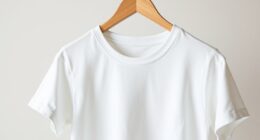The USD 4.7 billion L’Oreal deal clears Kering’s path by enabling the luxury giant to sell its beauty assets while strengthening L’Oreal’s leadership in luxury fragrances and cosmetics. With long-term licenses for brands like Gucci and Balenciaga, L’Oreal gains control over product development and distribution, positioning itself for future growth. If you want to discover how this move impacts the luxury beauty industry and what’s next, keep exploring the details.
Key Takeaways
- The $4.7 billion deal involves Kering selling its beauty assets, including fragrances and cosmetics, to L’Oreal.
- The sale allows Kering to reduce debt and focus on core fashion brands like Gucci and Saint Laurent.
- L’Oreal gains exclusive 50-year licenses for brands such as Gucci, Bottega Veneta, and Balenciaga, expanding its luxury portfolio.
- The acquisition strengthens L’Oreal’s leadership in luxury beauty and high-end fragrances, fostering industry consolidation.
- The deal’s approval clears the way for Kering to streamline operations and pursue growth in its core fashion segments.

Is L’Oreal’s latest deal a game-changer for the luxury beauty industry? It sure seems like it. Valued at around $4.6 billion to $4.7 billion, this acquisition isn’t just a big financial move; it signals a strategic shift in how luxury brands approach growth and market presence. By acquiring Kering’s entire beauty portfolio, including the prestigious Creed fragrance line, L’Oreal positions itself to dominate the high-end beauty segment more than ever before. The deal also includes a long-term strategic alliance, which means both companies will collaborate closely over many years. L’Oreal gains exclusive licenses for iconic brands like Gucci, Bottega Veneta, and Balenciaga—each for a staggering 50 years. This gives L’Oreal control over fragrance and cosmetics development, providing a steady pipeline of luxury products that appeal to discerning consumers worldwide. The timing of this deal isn’t coincidental. Kering, aiming to streamline its operations, will use the proceeds to cut debt and sharpen its focus on core fashion businesses. This shift aligns with Kering’s new CEO, Luca de Meo, who seeks to address challenges like slowing growth in key markets such as China. The move also reflects Kering’s strategic decision to diversify revenue streams by creating a dedicated beauty division, although that division faced operational losses recently. Selling its beauty assets to L’Oreal not only reduces financial pressure but also allows Kering to concentrate on its more profitable fashion brands like Gucci and Saint Laurent. For Kering investors, the market responded positively, with its stock rising noticeably after the announcement, signaling confidence in the company’s long-term strategy. On the other side, L’Oreal enhances its position as the leader in luxury beauty. The acquisition of Creed, a high-end fragrance brand renowned for craftsmanship and rare natural ingredients, expands L’Oreal’s footprint in niche fragrances and accelerates Creed’s global development. This move taps into the growing demand for artisanal, high-quality fragrances, giving L’Oreal an edge over competitors like LVMH and Hermes. The licensed brands, especially Gucci, will benefit from L’Oreal’s extensive distribution and marketing capabilities, revealing long-term potential. The deal also opens doors to explore wellness and longevity trends, aligning with evolving consumer interests in health and well-being. Furthermore, the deal is expected to set a precedent for future industry mergers and licensing agreements, shaping the landscape of luxury beauty for years to come.
Frequently Asked Questions
How Will the Deal Impact Kering’s Overall Brand Portfolio?
The deal will diversify and strengthen your brand portfolio by adding high-profile beauty assets to your fashion and eyewear segments. You’ll gain access to L’Oréal’s innovation and distribution networks, boosting your market reach and revenue streams. This expansion enhances your ability to target luxury consumers holistically, increasing cross-brand loyalty. Overall, your brand portfolio becomes more resilient, balanced, and positioned for sustainable growth across multiple luxury categories.
What Are the Strategic Reasons Behind L’Oreal’s Acquisition?
Strategic synergy sparks L’Oréal’s savvy shift into luxury beauty, securing superior, stylish, and high-margin assets. You see, this acquisition allows you to expand your portfolio with diverse, desirable brands, boosting your global grip. It also streamlines operations, fosters innovation, and strengthens your standing in the luxury segment. By embracing this bold move, you position yourself for prosperous growth, increased market share, and a competitive edge in the evolving beauty landscape.
How Will This Deal Influence the Global Beauty Market Competition?
This deal will make you see L’Oréal dominating the luxury beauty market, putting pressure on competitors to innovate or acquire similar brands. You’ll notice stronger brand collaborations and increased marketing efforts, which could lead to intensified competition worldwide. As L’Oréal leverages its expanded portfolio, other firms might need to adapt quickly to stay relevant. Overall, it shifts the industry landscape, making the race for market share more fierce and strategic.
Are There Any Regulatory Hurdles Anticipated for This Transaction?
You should expect regulatory hurdles because authorities will scrutinize the deal’s impact on market competition. While no major obstacles have been publicly reported yet, regulators might examine concerns about reduced competition in luxury beauty and fragrances, especially with high-profile brand licenses and exclusivity agreements. They’ll assess whether the deal lessens consumer choice or creates a monopoly, possibly leading to conditions or delays before approval.
What Are the Future Growth Projections Post-Deal?
You can expect strong future growth projections, as the deal accelerates Kering’s expansion in luxury beauty through L’Oréal’s expertise and global distribution. With access to new markets and product lines, your brands like Gucci and Balenciaga will reach more customers quickly. The collaboration also enhances innovation and brand value, fueling sustained growth. Plus, steady royalty income and operational focus on core fashion will further strengthen long-term profitability and market position.
Conclusion
You see, this blockbuster billion-dollar deal boldly boosts Kering’s brand, blurring boundaries and building bridges in the beauty biz. With wealth and wisdom working together, it paves a promising pathway, propelling progress and potential. This powerful partnership proves that persistence and passion propel progress, pushing competitors to pause and ponder. Ultimately, this united venture unlocks unparalleled opportunities, unleashing a new era of excellence and expansion in the evolving beauty landscape.










